
Admission Inquiry
New Term Starts on Oct 6, 2025
Online Master of Science in Cyber Security Degree Program
Overview
ECCU’s Master of Science in Cyber Security (MSCS) program prepares professionals to assume cybersecurity and information assurance leadership roles in corporations, agencies, and organizations. A curriculum rich in computer security management, IT security threat assessment, incident response, organizational management and behavior, and leadership challenges students to become creators of knowledge and inventors of processes.
ECCU’s online master’s in cybersecurity has been divided into a set of core courses that provide the necessary skills in cybersecurity, organizational behavior, and structure, research, and writing. The cyber security master’s degree online then offers various specializations to allow students to select specific fields of study that they are passionate about, each having well-defined job prospects, derived from the NICE framework, affiliated with them.
EC-Council University's 100% Online cybersecurity master's degree allows students to complete coursework in a timeframe that fits their schedule. This also requires that the student has the appropriate technology and connectivity to sustain constant participation in class activities.
Program Summary
LEVEL OF STUDY
Graduate
NUMBER OF COURSES
12 (36 Semester Credit Hours)
MODE OF STUDY
Online (Flexible with Hands-On Experience)
DURATION
2 Years – 10-week terms (4 per year)
TERM BEGINS ON
Oct 6, 2025

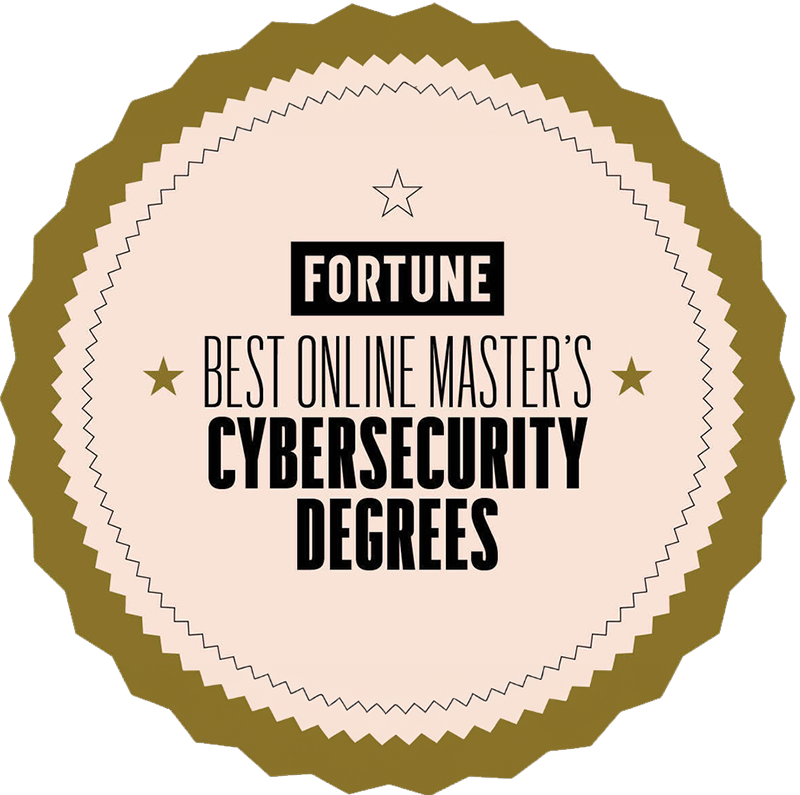
EC-Council University has been ranked among “The Top 10 Best Online Master’s in Cybersecurity” by Fortune®, underscoring our commitment to excellence, innovation, and ethical practices in cybersecurity education.
From Fortune. ©2024 Fortune Media IP Limited. All rights reserved. Used under license.

About Master of Science in Cyber Security
Developed from a learning model based on Bloom’s Taxonomy, the objectives of ECCU’s cyber security master’s degree program are to identify what students should learn, understand, and be able to do based on their EC-Council University coursework.
The university’s cyber security master’s degree programs are established with a mix of both business management and applied practical technology studies. This is based on the industry’s need to have a balance of applied skills and disciplines in both technical domains of research and practical business knowledge in the workplace. The purely technical theory or heavily managerial focus of some programs does not produce as well-rounded a cybersecurity expert as is generally desired by the industry.
What you will learn upon completion of a Master’s Degree in Cyber Security :
ECCU’s master’s in cyber security program will help you train in the following skills:
- The application of technical strategies, tools, and techniques to secure data and information for a client or customer.
- Adherence to a high standard of ethical behavior.
- The use of research in both established venues and innovative applications to expand the body of knowledge in cybersecurity.
- The application of critical thinking to creatively and systematically solve the problems and meet the challenges of the ever-changing environments of cybersecurity.
- The mastery of the skills necessary to move into leadership roles in companies, agencies, divisions, and departments.
Course Structure
The course structure of ECCU’s master’s degree in cyber security is presented over 10-week terms and consists of assigned readings, threaded discussions, case studies, written analysis, research projects, and examinations.
Students of the master’s degree in cyber security must spend 10-12 hours of study a week to complete the work. ECCU encourages regular and frequent student-faculty interaction via the internet. The syllabus and grading rubrics of the cybersecurity master’s degree set out the course requirements, expectations, and timelines, and students are kept abreast of their progress in the course through the My ECCU Online Learning Management System.
Course Delivery of Masters in Cybersecurity
Coursework of Master’s in Cyber Security degree program is delivered through a 100% online, providing the flexibility of time management whereby students can attend to coursework at any time of day/night or weekends (24×7). There is a structure to the week and term whereby attendance and submissions must meet predefined deadlines each week and weekly attendance and participation are mandatory. Synchronous scheduled class times are not utilized, but adherence to discussion and homework weekly posting deadlines are.
ECCU’s cyber security master’s degree utilizes traditional university 10-week terms and is structured accordingly. The course delivery sits in a flexible middle ground between the structure of set class times and attendance and the open-ended system of self-paced independent study courses.
Each course under the master’s degree in cyber security program is instructor-led by credentialed professors with industry experience with a maximum enrollment of 30 students. Guided discussion, interaction/engagement, assistance/support, and grading/feedback will be done with your professor weekly as the course proceeds.
Courses in the masters in cyber security typically consist of a mixture of weekly threaded discussions, reading materials, iLabs (ECCU’s online virtual platform to practice), presentation support (PowerPoint and/or video), quizzes/exams, and/or research projects/papers.
Candidates who wish to pursue ECCU’s master’s in cyber security online degree can choose one of its five specializations – Security Analyst, Cloud Security Architect, Digital Forensics, Incident Management, and Business Continuity and Executive Leadership in Information Assurance

Virtual Labs
100% Virtualization for a Complete Learning Experience!
iLabs was built for you. Whether you’re a beginner or an expert, iLabs is entirely customizable to your needs. No experience necessary!
Practical hands-on learning provides access to real-world tools and scenarios, boosts knowledge retention, and is proven to be more effective at preparing you for the job!

Admission Requirements for MS Cybersecurity
Applicants for admission must have a Bachelor’s degree from an accredited institution and a TOEFL score of 550 or better (or proof of English competency).
For more information about admission requirements, please visit our Admission page.
- Student Enrollment Application.
- Official government ID or passport (international students).
- A photo of yourself holding your official government ID.
- Official transcript(s) from the institution where the student received bachelor’s degree or most recent master’s degree.
- An official evaluation of international credits (for students with international transcripts only).
- Proof of English proficiency (international students only; see the section on English Requirement for International Students).
- Application fee.
Graduation Requirements
EC-Council University will award the Master of Science in Cybersecurity degree upon successful completion of all degree requirements.
In addition to the specific degree requirements, each candidate for graduation must meet the following requirements:
- Completion of thirty-six (36) semester credits of 500 level courses in which the candidate earned a cumulative GPA of 3.0 or better.
- Satisfactory completion of the summative capstone course.
- All degree requirements must be completed within one and a half times the program length or have a cumulative course completion rate of 67% of coursework from the date the student enrolls in the university and begins the MS in Information Security program
Industry Certifications Included in the Cybersecurity Master’s Degree Programs!
ECCU understands the modern students need to be industry-ready. Hence, all of EC Council’s relevant industry certifications have been included in the various specialisations. Earn up to 3 industry certifications for any specialisation selected.
| Certifications | Master’s Degree Courses |
ECCU Student Price |
|---|---|---|

|
ECCU 500 Managing Secure Network Systems |
Inclusive |

|
ECCU 501 Ethical Hacking and Countermeasures |
Inclusive |

|
ECCU 502 Investigating Network Intrusions and Computer Forensics |
Inclusive |

|
ECCU 506 Conducting Penetration and Security Tests ECCU 503 Security Analyst and Vulnerability Assessment |
Inclusive Exam Fee: $799 |

|
ECCU 513 Disaster Recovery |
Inclusive |

|
ECCU 522 Incident Handling and Response |
Inclusive |

|
ECCU 523 Executive Governance and Management* |
Inclusive |

|
ECCU 523 Executive Governance and Management* |
Exam Fee: $999 |
*Upon successful completion of this course, students will be provided with an opportunity to take the EC-Council Information Security Manager (EISM) certification exam. Note: Students who are interested in taking the CCISO exam will need to purchase a voucher from the ECCU Bookstore; in order to take the CCISO exam, student must show at least 5 years of experience in three of the CCISO domains.
Pricing: Master of Science in Cyber Security
TUITION FEES
One Course Fee:
Number of Courses:
$1,620
12
$19,440
- Books & Instructional Material
- Grammarly, a tool to Write Proficiently
- Weekly Live Online Classes
- Up to 4 Certification Exam Vouchers
Technology Fee:
iLAB Fee:
USD 50
per term
USD 50
whenever needed
The ECCU Governing Board has defined the regions. Student tuition rates are based on their official government photo ID that was submitted with the student admission application to determine the student’s region.

Transfer of Credits
As a prospective EC-Council University student and current industry-recognized certification holder, you can also earn semester credits toward your cybersecurity courses based on your prior learning/industry certifications.
Under the prior learning portfolio policy, ECCU for its cybersecurity master’s degree accepts certifications related to ethical hacking, penetration testing, network defense, digital forensics, incident handling, and much more.
Click here to read more about the EC-Council University Transfer of Credits program.
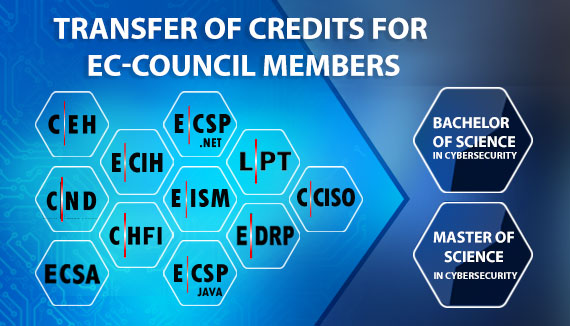
Apply For A Scholarship
Education is a major foundation of a person’s professional and personal growth. At EC-Council University, we not only recognize and accept many external scholarships but also have many scholarship opportunities available at EC-Council University for Master of Science in Cyber Security students.

Cybersecurity Hero’s
Scholarship
ECCU is also dedicated to equipping our veteran community to become warriors in the battle for cybersecurity.
Hero's Scholarship »
Cyber Challenge
A unique challenge to create awareness and opportunities for enthusiasts in the industry.
Cyber Challenge »
The Cybersecurity Dean's Scholarship
A unique scholarship opportunity to provide tuition assistance to new or current undergraduate and graduate students.
Dean's Scholarship »
New Mexico Cybersecurity Scholarship
An amazing scholarship opportunity for new or current undergraduate and graduate students, specifically from New Mexico.
New Mexico Scholarship »ECCU’s Online Cybersecurity Masters Degree Specializations
Security Analyst
The Information Security Analyst specialization of the Cybersecurity master’s degree focuses on testing methods and techniques to effectively identify and mitigate risks to the security of a company’s infrastructure while providing application and network-based security vulnerability assessments, pen testing, and securing wireless networks including authentication, authorization, and encryption in accordance with industry-accepted methods and protocols.
By specializing as an IT security analyst, you will be given the opportunity to train in various domains through specialized online ethical hacking and penetration testing courses. The average cybersecurity analyst salary, according to PayScale, is $75,883.
Read More »

Cloud Security Architect
The Cloud Security Architect specialization skills of the Cybersecurity master’s degree are focused on planning, analyzing, designing, configuring, testing, implementing, maintaining, and supporting an organization’s on-premise and cloud security infrastructure.
The Cloud Security Architect’s responsibilities include training to harden enterprise architecture and cloud architecture from the most advanced attacks and secure programming practices to overcome these inherent drawbacks to pre-empt bugs from the code and designing and implementing cloud security. The average cloud security architect salary, according to PayScale, is $123,642.
Read More »Digital Forensics
The Digital Forensic specialization of ECCU’s Masters degree cyber security program focuses on demonstrating the required skill set of a Computer Forensic Investigator. Through this specialization, candidates who aspire to become digital forensics experts will learn the various aspects of digital forensics, including investigating network intrusions and mobile forensics. With a specialization in digital forensics, you may qualify as a Digital Forensic Investigator with the government at any level, as well as private industry––both on or leading an incident response team. The average digital forensics salary, according to PayScale, is $73,798.
Read More »

Incident Management and Business Continuity
The Incident Management and Business Continuity specialization of ECCU’s Master’s degree cyber security program focuses on handling and responding to various security incidents, identifying vulnerabilities, and taking appropriate countermeasures to prevent information failure risks.
In this cybersecurity incident management and business continuity specialization of our master of science in cybersecurity program, you will be given the opportunity to train on incident handling, disaster recovery, business continuity, and much more.
Read More »Executive Leadership in Information Assurance
The Executive Leadership in Information Assurance specialization of the Master of Science in cybersecurity program focuses on providing the fundamental skills that are required to understand global leadership concepts, bringing together all the components required for a C-Level information security position, and providing students with the knowledge of how to manage IT security projects to enhance the success rate for both organizations and IT managers. This Executive Leadership program specialization mostly leads individuals to assume the position of CISO (and even CTO) at companies.
Executive Leadership training under information security master’s specialization includes global business leadership, executive governance and management, and project management in IT security.
Read More »
Cybersecurity Master’s Degree Program FAQs
Ans. A master’s in cybersecurity degree paves the way for a candidate to enter the industry as a professional and secure an executive-level position. EC-Council University’s Master of Science in Cyber Security degree has been designed to train candidates and transform them into professionals to assume leadership roles in corporations,agencies, and organizations. Job roles that one can aim for with acybersecurity master’s degree– Risk/Vulnerability Analyst/Manager, Information Security Analyst, Information Security Manager/Specialist, Chief Information Security Officer, among others.
Also read – What to do after you get a Master’s in Cyber Security?
Ans. Cybersecurity is amongst the most in-demand professions across the globe in 2020. A cybersecurity specialist has the responsibility of safeguarding a massive amount of private and sensitive data. Therefore, employees are willing to offer a hefty amount to candidates with the right skill set. According to PayScale, the average salary of a penetration tester in the United States is $83,968. Similarly, the average salary of a Software Security Engineer is $109,990.
Also read – Top 5 Cybersecurity Jobs of 2020
Ans. ECCU offers five specializations under its online master’s in cybersecurity program. Aspirants who wish to pursue this degree can choose one from – MSCS in Security Analyst, MSCS in Cloud Security Architect, MSCS in Digital Forensics, MSCS in Incident Management, and Business Continuity and MSCS in Executive Leadership in Information Assurance.
Ans. Cybersecurity is a continually growing industry. The rise in technological advancement and the parallel increase in the number of cyberattacks has made the need for cybersecurity specialists more vital. Getting an MS in cybersecurity can be worth it for candidates because of the growing demand for such professionals. With a master’s in cybersecurity online degree, candidates can fulfill the requirements of employers with the right skill set.
Also read – All about a master’s degree in cybersecurity
Ans. You should definitely go for a master’s in cyber security degree if you aim to rise high in your cyber security career pertaining to either of these five specializations: Security Analyst, Cloud Security Architect, Digital Forensics, Management and Business Continuity, Executive Leadership in Information Assurance. Following are some of the narrower job roles that these specializations will lead you to:
- Information Security Manager/Specialist
- Information Security Auditor
- Risk/Vulnerability Analyst/Manager
- Information Security Analyst
- Penetration Tester
- Security Architect
- Computer Network Defender
- Cyber security Defense Analyst
- Information Security (IS) Director
- Information Assurance (IA) Program Manager
- IT Project Manager
- Application Security Engineer/Manager
- Enterprise Architect
- Security Architect
- Research & Development Specialist
Ans. Aspiring students who have met the following conditions are eligible to apply for the master’s degree in cyber security:
- Have earned their bachelor’s degree or foreign equivalent from an appropriately accredited institution that is listed in the International Handbook of Universities, accredited by an agency recognized by the US Secretary of Education, and/or the Council for Higher Education Accreditation (CHEA).
- Have a Proof of English proficiency (international Students only see the section on English Requirement for International Students here https://www.eccu.edu/student-services/admission/)
Ans. The master’s in cyber security program at EC-Council University comes packaged with a string of industry-recognized certifications: Certified Network Defender (CND), Certified Ethical Hacker (CEH), Certified Hacking Forensic Investigator (CHFI), Certified Penetration Testing Professional (CPENT), Certified Chief Information Security Officer (CCISO), EC-Council Disaster Recovery Professional, EC-Council Certified Incident Handler (ECIH), EC-Council Information Security Manager (EISM). The master’s degree, of course, has a broader coverage of topics and offers a deeper insight into the specialized areas. Aspirants may earn up to 4 industry certifications for any specialization selected.
Ans. The master’s degree in Cyber Security is a 100% online program. It spans 2 years and is divided into “10-week terms” and 36 Semester credit hours.
Ans. Upon the successful completion of the master’s degree in Cyber Security, you will be able to master the skills necessary to move into leadership roles in companies, agencies, divisions, and departments. It will lead you to multitude of career opportunities including:
- Information Security Auditor
- information Security Manager/Specialist
- Risk/Vulnerability Analyst/Manager
- Information Security Analyst
- Penetration Tester
- Security Architect
- Computer Network Defender
- Cyber security Defense Analyst
- Information Security (IS) Director
- Information Assurance (IA) Program Manager
- IT Project Manager
- Application Security Engineer/Manager
- Enterprise Architect
- Security Architect
Ans. Students are evaluated by their participation in discussion threads, assignments, lab assessments and reports, final examinations, papers, course final projects, and the capstone course.
Ans. Prospective students wishing to attend EC-Council University (ECCU) shall submit a complete application package including:
- a list of all prior institutions attended with the application fee.
- a signed copy of a Student Enrollment Agreement (SEA).
- official transcripts for evaluation of transfer credits.
- a copy of your unofficial transcripts may be submitted for provisional admission.
- an official copy of transcripts must be submitted for full admission.
Ans. You will get a postmarked, phoned, or emailed notification issued by the ECCU administration regarding admission statuses of prospective students.
Ans. System of education in terms of format:
- All courses are offered in 10-week term using an online format via the myECCU portal.
- To be considered a full-time student, a graduate student must take two courses in each term, and undergraduate students must take three courses per term.
- Students opting for fewer courses a term will be considered part-time.
- All degree requirements must be completed within one and a half times the program length as measured by course completion rate of 67% of course work from the first term the student enrolls in the University and begins the program to graduation.
- All credits awarded by EC-Council University are semester hour credits.
- Credits are awarded only upon successful completion of a course or project requirements.
- Students will graduate with honors if they have a cumulative GPA of:
- Cum Laude – for grade point averages of 3.75 through 3.84
- Magna Cum Laude – for grade point averages of 3.85 through 3.94
- Summa Cum Laude – for grade point averages of 3.95 and above
Ans. EC-Council is not currently approved by the US Department of Education as an eligible Title IV institution. While we do not currently participate in Title IV funded student loan programs, no-interest institutional payment plans are available.
However, EC-Council University offers monthly payment plans that divide the tuition into three equal payments. The initial payment is paid before the start of the first class of the term, and the subsequent two payments are due mid-month (15th) the first and second month of the term. This payment plan comes interest free. For a continued eligibility for program participation, students need to ensure a good standing.
- Once the Course Drop period has passed, students are permitted to withdraw from a course until 60% of the scheduled course length has elapsed.
- A student who withdraws from all courses will be withdrawn from the University and will be subjected to the institution’s refund policy as described in the University Catalog.*
- Anticipated graduation dates may be adjusted for students who withdraw from registered courses during a term. Student who withdraws from a course will no longer be allowed to continue with that.
- Within the withdrawal period, students will get a withdrawal grade (W) on their transcripts for classes from which they have been withdrawn. See the Satisfactory Academic Progress Policy to understand the impacts of withdrawing from one or more courses.
- Tuition will continue to reflect the tuition billed at the close of the course drop period. Once 60% of the scheduled course length has passed, the student will receive a failing grade (FD) on their transcript for any classes from which they have been withdrawn. See the Satisfactory Academic Progress Policy to understand the impacts of withdrawing from one or more courses.
- Tuition segment reflects the tuition billed at the close of the course drop period. To meet program completion requirements, a student will need to register for any failed or withdrawn courses in a future term, which may also impact the anticipated graduation date.
- Anticipated graduation dates may be adjusted for students who withdraw from registered courses during a term.
- Students who fail to notify the university that they have stopped attending and wish to withdraw from a class are still scheduled in the class. Students who do not attend for 21 days will be Administratively withdrawn per the Attendance Policy. See the Satisfactory Academic Progress Policy to understand the impacts of being withdrawn from one or more courses. Tuition will continue to reflect the tuition billed at the close of the drop period.
- The course structure of master’s in cyber security is presented over 10-week terms and consists of assigned readings, threaded discussions, case studies, written analysis, research projects, and examinations.
- The level of study is graduate, the number of courses is 12, and the span of the course is 36 credit hours.
- Students must spend 10-12 hours of study a week to complete the work.
- ECCU encourages regularity of attendance in the student-faculty online interaction sessions.
- Online live sessions provide students with an opportunity for interaction and engagement regarding course content.
- The entire syllabus is graded on the basis of grading rubrics of cyber security master’s degree. The course requirements, expectations, and timelines keep students abreast of their progress in the course through the My ECCU Online Learning Management System.
Ans. ECCU’s internships and capstone projects allow for applied avenues of academic knowledge in real-world / workplace settings. Under the aegis of ECCU, students will identify internship opportunities in their local area through the networking activities of the university, corporate partners, and student initiative.
ABOUT EC-COUNCIL UNIVERSITY (ECCU)
EC-Council University is a premier institute of cyber security studies and technologies. It is an accredited institute that provides 100% online programs in cyber security at the graduate and undergraduate levels enabling its graduates to obtain advanced cyber skillsets. Its unique programs allow its students to lead their peers to manage cyber security risks strategically and effectively in their organizations. Intelligent.com has ranked EC-Council university in the “The Top 45 Online master’s in Internet security degree programs” by highlighting its high standards of quality education.


Fulfill your dream of becoming a Cybersecurity Leader.
Become a student at EC-Council University today!


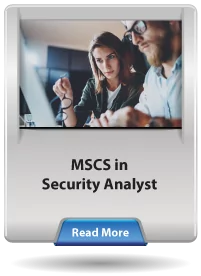
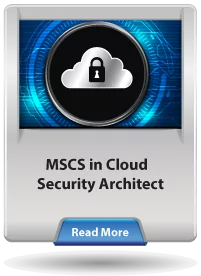
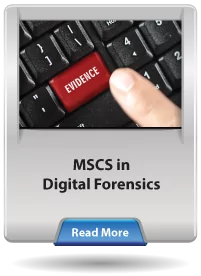

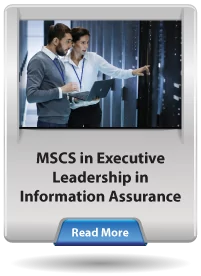


.webp)